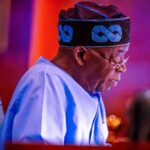Economists do not make economies; they merely attempt to explain them.
When President Bola Ahmed Tinubu whimsically and hastily announced during his inaugural speech the total withdrawal of subsidy on fuel, along with the merger of the dual exchange rates, I suspected three things behind the move.
The first was that in view of the contentious election that brought him to power and the resultant litigations swirling around him in the courts, President Tinubu might have been trying to curry the United States of America (USA) which favours he probably thought would help him fend off the pressure he was facing from political opponents.
As the US had been urging Nigeria to implement that policy perhaps President Tinubu reckoned that an early winner like that would send signals to the appropriate US authorities that Tinubu was the right man “to do business with” in Nigeria and thus should be let alone.
Peter Obi knocks Tinubu, says palliatives result of Limited Thinking
Expert advocates psychologists’ inclusion in educational system
The second suspicion I had about President Tinubu’s fuel subsidy removal move was that having probably met a near empty revenue situation, he needed to shore up the revenue base of the in-coming administration in order run the government effectively. One of the areas that had been identified by economists as guzzling up money was the subsidy on fuel amounting to billions of naira. The argument had been strenuously made that the funds deployed to provide the subsidy which invariably ended up with well-connected persons would have been better applied to other critical areas of the economy.
Thirdly, and allied to the second, is that President Tinubu was very likely trying to replicate what he did as Governor of Lagos State when he set up a revenue collection system which more than doubled the accruable revenue to the state. But this also came with a pecuniary interest; a certain percentage of the revenue collected in Lagos was retained by a company, allegedly linked to him, which made him immensely wealthy. If the same thing is to happen at the federal level, it will make him rich beyond imagination.
With the latest appointments, the A-team rent collectors are now in place to implement the Tinubu agenda of revenue/tax collection which constitutes the main plank of his administration’s economic plan for Nigeria. From customs to immigration, Federal Inland Revenue Service (FIRS) to revenue policy regulating and supervising institutions like the Ministry of Finance, accountant-general’s office, central bank, etc, the stage is set for the unfurling of Tinubunomics, an agenda for the massive mopping up of funds from the Nigerian system, not necessarily for the benefit of Nigeria, but largely for the personal benefit of President Tinubu’s political and economic empire. President Tinubu’s cut-and-paste policy wonks now ensconced in the strategic sectors of the administration will see to that with the firm supervision of the president who himself is a seasoned accountant.
That was what President Tinubu did in Lagos as governor and is set to do from the looks of things as President of the Federal Republic of Nigeria. The end result of Tinubunomics is that by the time he is through with his tenure there will probably be no figure of note that will be in a position to challenge his political and economic empire.
But as it is, the underlying assumptions of Tinubunomics have been dealt a massive blow. The subsidy removal which has been touted by our pie-in-the-sky economists as the silver bullet that will slake the structural distortions in our economy, has done the reverse of what it was intended to do. The silver bullet has instead virtually killed off the economy with ever rising inflation, widening poverty, among other things.
Moreover, the total removal of subsidy, which it was assumed had bottomed off the issue of subsidies altogether in the system, has proven to be false. Today, with the global price of oil rising to about $100 per barrel, the price of between N613 to N620 that obtains at the pumps, is unsustainable going by the reality of market forces. This is because the rise in global oil prices has automatically and correspondingly increased the landing costs of the commodity for importers. This means that unless subsidised by the government, it will be unrealistic to continue to keep the current pump price of the commodity. And that invariably means the pump price would have realistically been hovering around N1,000 had the government not been subsidising it.
As it is now, with the current developments in the global and domestic oil situation, the government has been humiliated on its removal of oil subsidy policy. If the government further removes the subsidy and allows the free market to dictate the pump price resulting in the rise to N1,000 or thereabout, it risks facing a social revolt nationwide from the already stretched people of Nigeria. If on the other hand it continues to subsidise the price of the commodity at current rates, then what argument can it offer to convince the International Monetary Fund (IMF) in justification for this policy summersault?
As with oil subsidy, so also the assumption that cozying up to the Americans will result in support for President Tinubu. As we all know, American governments operate a no-permanent-friends-but-interests-policy in their foreign relations. As far as the US is concerned, nations complying with US demands for economic reforms do so in their own interests and not that of the US. And having learned hard lessons over the years in their policy of lending support to leaders around the world, who eventually ended up on the wrong side of the peoples of their nations, President Tinubu should not take it as a slam dunk that America will support him even if he sold Nigeria plot by plot to them.
By all considerations, against this background the only possible area where Tinubunomics is likely to work is the huge percentage that President Tinubu and his revenue collection A-team stand to rake in from their control of financial and revenue levers of the economy. But as it happened in Lagos under his tenure as Governor where only a few around him gained and the large majority of the populace were left out, the same will be replicated under Tinubu as president of Nigeria.
Under the circumstance as Tinubunomics is certainly not what Nigerians need it is imperative that we demand a comprehensive, inclusive and far reaching economic model that is purpose fit for the country. (To be continued)

 Join Daily Trust WhatsApp Community For Quick Access To News and Happenings Around You.
Join Daily Trust WhatsApp Community For Quick Access To News and Happenings Around You.



